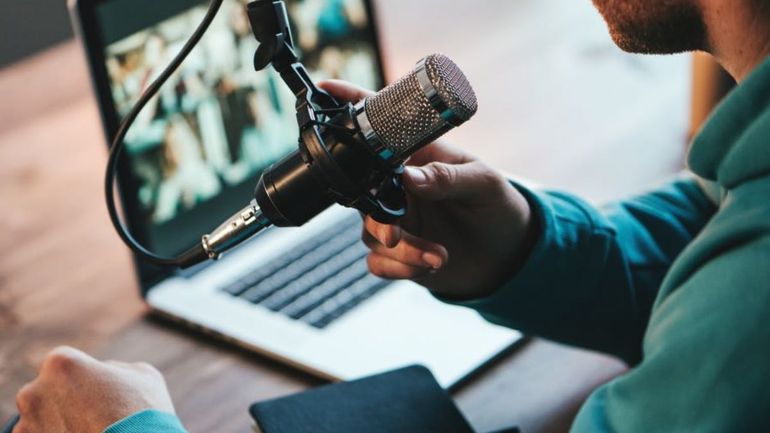
Study Reveals Podcast Listeners Prefer Transparent Ad Signposting

Recent research conducted by CAP indicates that podcast enthusiasts prefer clear indications, such as catchy tunes and distinct labels, to identify advertisements during their listening experience.
Podcast listeners want clearer signposting for adverts in podcasts, according to research by the Committee of Advertising Practice (CAP).
Listeners prefer clear labels to indicate when they are hearing an advertisement in a podcast. The terms 'paid-for-advertisement' and 'sponsored' are considered the most effective in this regard.
Using phrases like 'partnered with' or 'brought to you by' can create confusion for consumers because they imply a mutual relationship between the host and advertiser that may not be strictly transactional.
Listeners also appreciate clear signals, like musical jingles at the beginning and end, to differentiate the editorial content from advertisements. They also prefer a noticeable shift in the host's tone, such as being more robotic, animated, or scripted, to easily distinguish the ad. In addition, shorter ads are preferred by listeners.
Project lead Beth Erwin believes that listeners should not have to guess or "play detective" when trying to determine if something is an advertisement or not.
Podcasters can maintain their audience's trust and connection by being transparent about when ads are featured, preventing any damage to the authenticity they have worked hard to establish. According to a recent ruling by the Advertising Standards Authority (ASA) in 2022, deceptive advertising in podcasts has prompted new guidance from CAP, published today on May 16.
Podcast landscape
The ruling involved an advertisement for the nutrition brand Huel that was featured on Steven Bartlett's podcast The Diary Of A CEO on Spotify. A complaint was made questioning whether the ad was clearly recognizable as a marketing promotion. The ASA instructed Huel and Bartlett to clearly indicate the commercial nature of advertising content in podcasts going forward, making sure that a clear distinction is made between commercial and editorial content.
The CAP research shows that podcast listeners tend to feel a closer connection with podcast hosts compared to other forms of media, which builds a strong sense of trust in their viewpoints.
Furthermore, the podcast industry is viewed as less commercial than TV and radio, which enhances the level of trust that listeners place on podcast hosts and advertisers.
Some listeners felt that advertisements which were not relevant to the podcast's content, host, or theme disrupted their initial experience.
Erwin acknowledges that podcasts have a large following and are a popular way for people to enjoy free, entertaining, and educational content. He also recognizes that advertising is crucial for funding most podcasts.
Our research indicates that people prefer a clear distinction between advertisements and editorial content. Failing to differentiate between the two may lead to feelings of deception.
Podcasting is becoming increasingly popular and has great economic potential. In 2023, spending on podcast advertising grew by 23% year-on-year to £83m, up from £68m the previous year, according to the most recent IAB/PwC Digital Adspend report.
However, a 2023 YouGov study found that only 14% of listeners find ads in podcasts interesting and not interruptive, while 42% skip them altogether.
According to YouGov, 18% of listeners find podcast ads intrusive but still choose to listen to them, and 14% neither find them intrusive nor interesting.
The debate over podcast funding continues to be a topic of discussion. Recently, key media companies in the UK, such as ITV, Sky, and Bauer, have expressed their worries to the government about the BBC's proposal to include advertising in podcasts for British audiences.
Earlier this year, the BBC revealed their intention to incorporate advertisements into podcast platforms, citing that it is a common practice in the industry.
A group of 20 media businesses have written an open letter to Culture Secretary Lucy Frazer, expressing their concerns about the potential consequences of a certain move.
In the letter, they highlighted that extracting audio advertising funds from the UK podcasting market could have a disastrous impact, particularly affecting small independent podcast producers.
Editor's P/S:
The research findings on podcast advertising provide valuable insights into the preferences and experiences of listeners. Clear and transparent labeling of advertisements is essential to maintain listeners' trust and prevent confusion. Podcasters should strive to differentiate ads from editorial content through distinct signals, such as musical jingles or changes in the host's tone. By adhering to these guidelines, podcasters can ensure that listeners have a positive and engaging experience while supporting the financial sustainability of their shows.
Moreover, the article highlights the ongoing debate surrounding the funding of podcasts, particularly in the context of the BBC's plans to introduce advertising. The concerns raised by media companies regarding the potential negative impact on independent podcast producers are valid and should be considered. Striking a balance between funding models and preserving the integrity and diversity of the podcast landscape is crucial.






